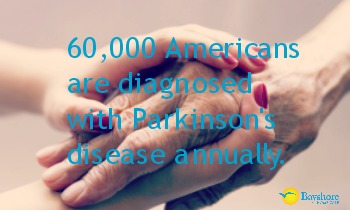Parkinson’s disease is a progressive, degenerative disease affecting movement and cognition over time. People usually notice those with Parkinson’s because they have hand and/or head tremors, rigidity in the body and an unusual gait.
Parkinson’s typically begins to manifest itself when people are in their 60’s. Nearly 60,000 Americans are diagnosed with the disease annually. Parkinson’s affects motor ability, causing compromised balance and resulting in an increased risk of falls. Although there is not currently a cure for Parkinson’s there are treatments that reduce the severity of the symptoms, allowing those with the disease some comfort and relief.
If you or a loved one is experiencing any of the following symptoms you may want to consider visiting your primary care physician.
Warning Signs:
- Tremors – a mild shaking of the hand, lip or head.
- Stiffness/rigidity in muscles – which doesn’t go away when you start moving about. Your arms remain at your side while walking or your feet feel glued to the ground.
- Posture becomes more bent and you stoop over.
- Speech becomes softer – a hoarseness when you are speaking or a noticeable change in projecting your voice.
- Impaired sense of smell – this is one of the earliest signs. Foods seem to lose their aroma.
- Handwriting changes – smaller, cramped lettering, and difficulty writing.
- Sleep disturbance – arm and leg movements or flailing during deep sleep or trouble falling asleep.
- Facial expression – less expression, mask-like.
- Constipation – even with a good diet and fluids.
- Feeling dizzy – becoming lightheaded or even fainting.
As you can see, several of these things are common in the normal aging process. If symptoms occur in combinations and don’t improve you should seek specialized medical attention.
We recommend the National Parkinson’s Foundation to all caregivers and people suffering from Parkinson’s. This foundation is a phenomenal resource for education, treatments, support and research.

